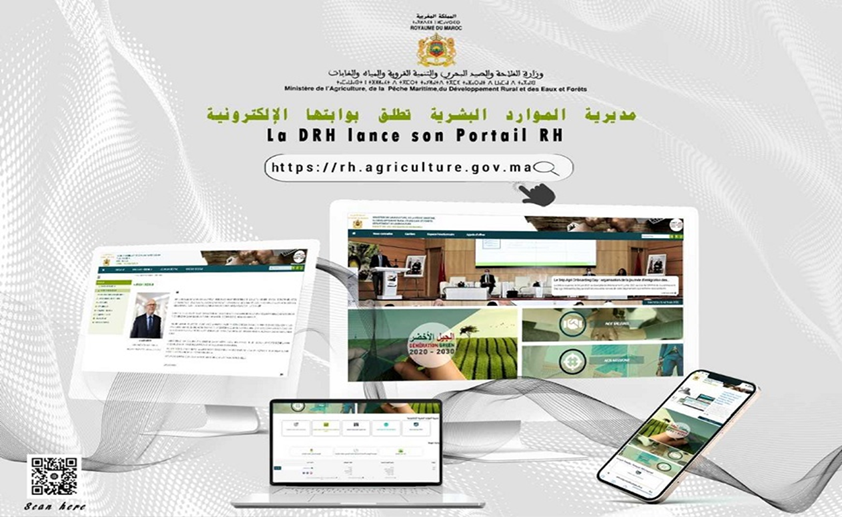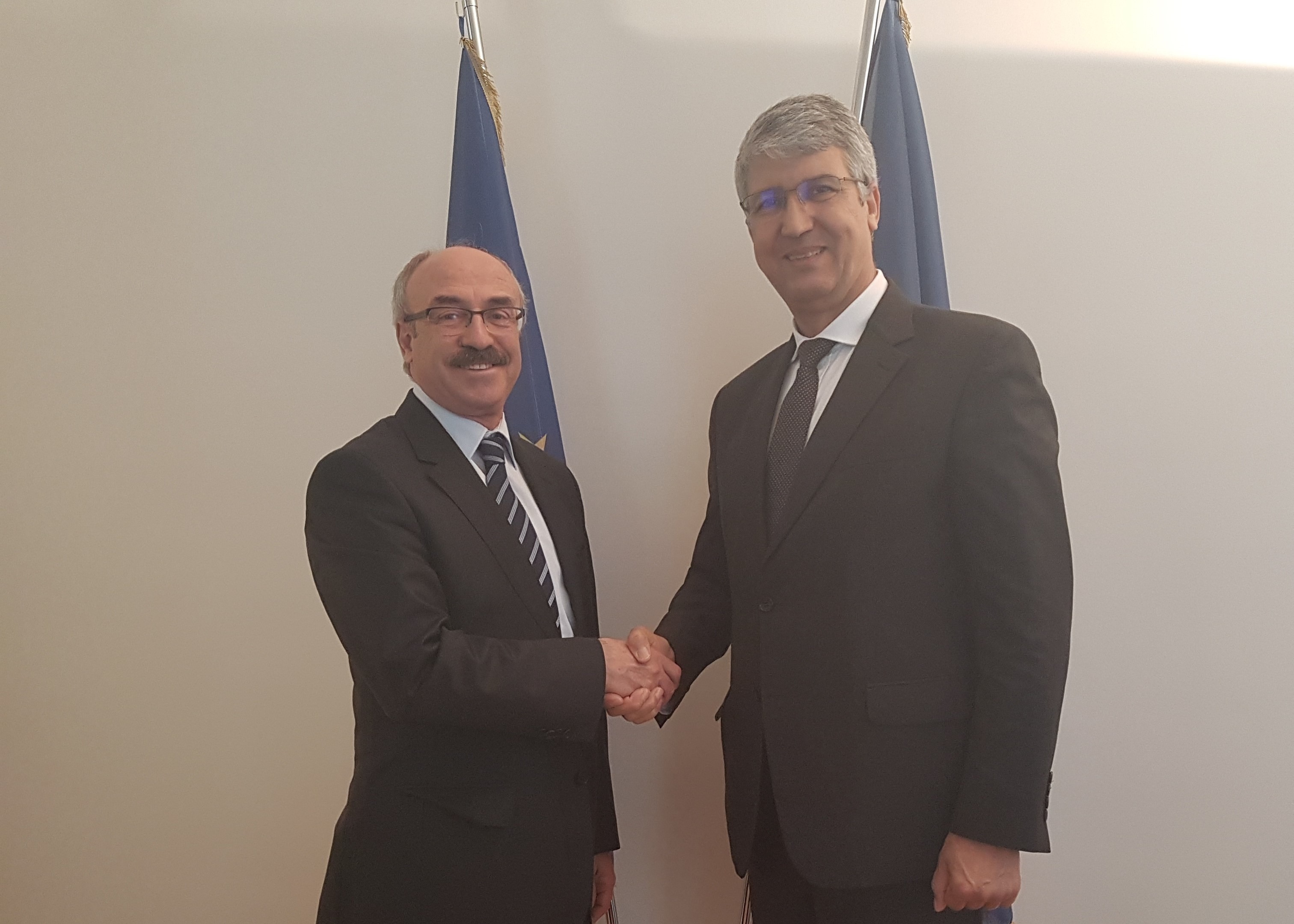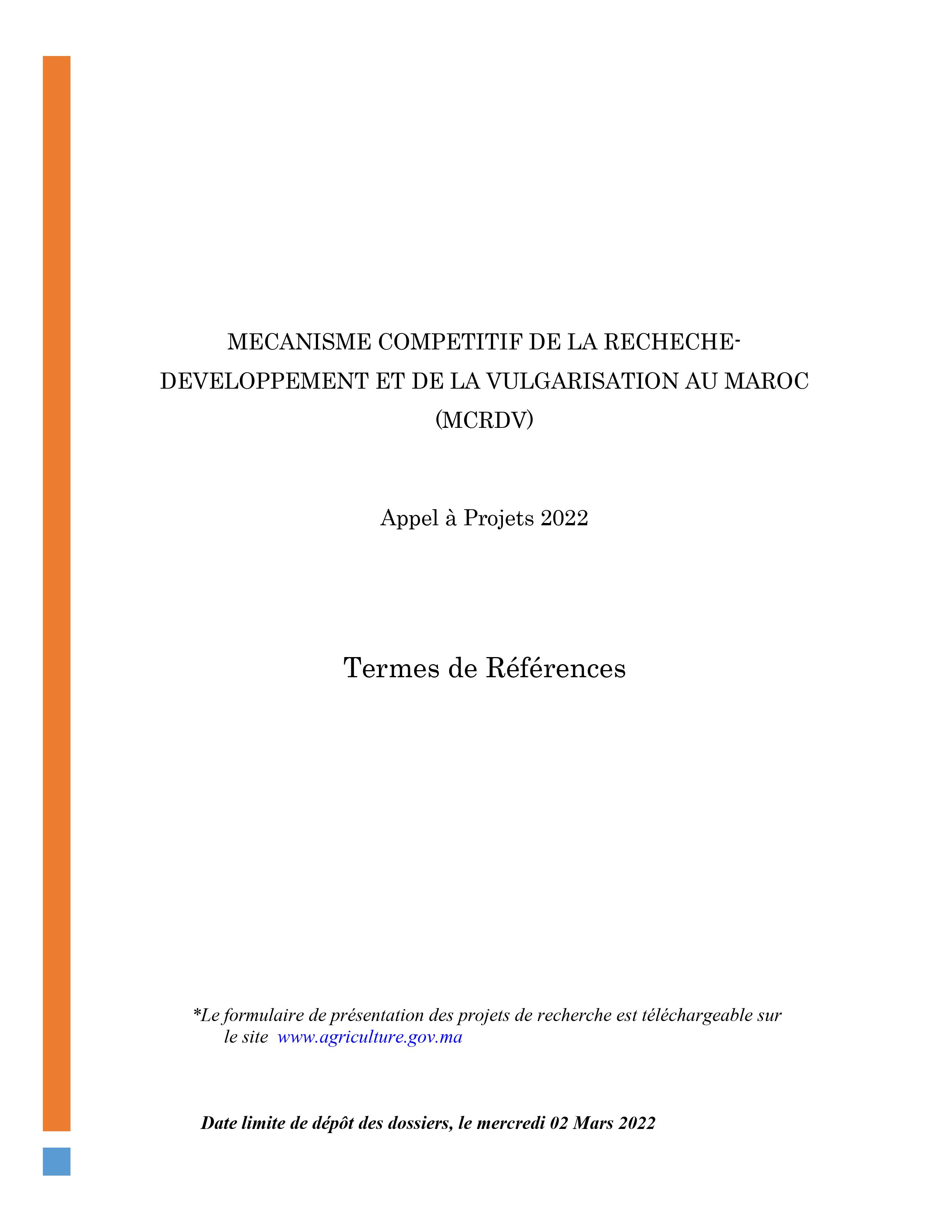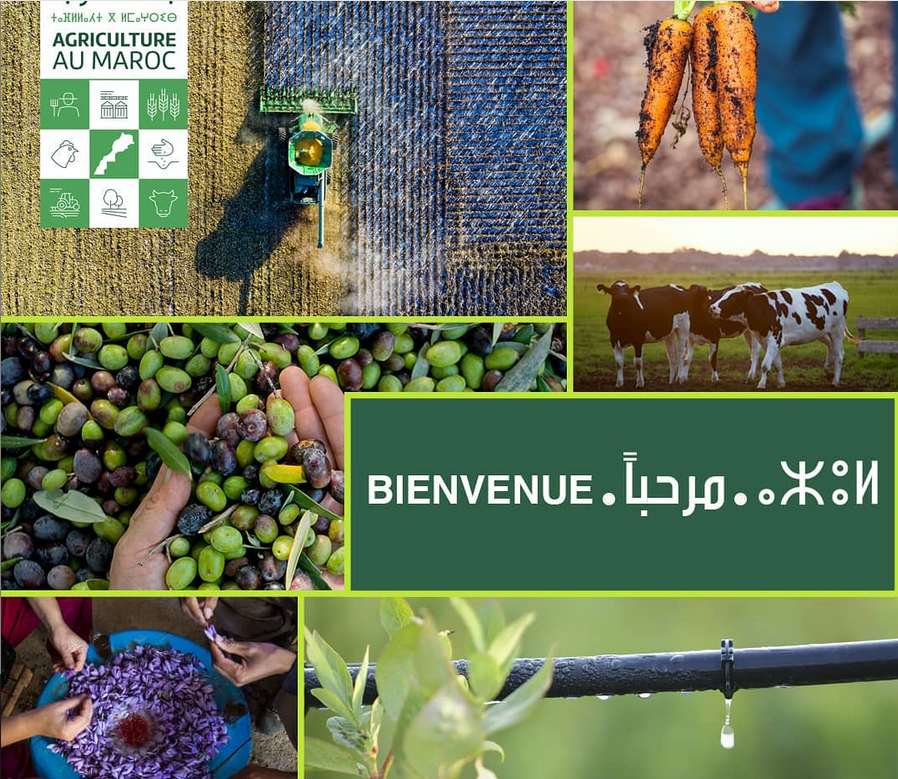
La DRH lance son portail RH
Dans le cadre de sa stratégie d’ouverture sur ses environnements interne et externe et prouvant son engagement dans une démarche de partage et de proximité, la Direction des Ressources Humaines a le plaisir de vous accueillir dans son nouvel espace virtuel accessible via : https://rh.agriculture.gov.ma

Secretary General of the Ministry of Agriculture elected President of the CIHEAM
Professor Mohammed Sadiki, currently Secretary General of the Ministry of Agriculture, Maritime Fisheries, Rural Development and Forests of the Kingdom of Morocco, has been elected today, President of the International Centre for Mediterranean Agronomic Studies (CIHEAM) by the 13 member countries of the centre. The election took place during the 141st Governing Board meeting of the Organization the 21 December 2018, in Paris. Professor Mohammed Sadiki succeeds to Professor Masum Burak holding Turkish nationality. Holder of a PhD, a Doctorate of Agricultural Sciences, a degree of engineer in Agronomy and a Master (DEA) in plant genetics, Mr. Sadiki has garnered thirty-three years of professional life rich in varied experiences and know-how at the crossroads of academic, scientific, research-innovation and agricultural development. His career accounts many responsibilities at different high-level positions in education and training, research and innovation, and agricultural and rural development. He has extended his skills to issues of development policy analysis and developed a solid know-how in international cooperation, networking and partnership facilitation, through networks and long-standing relationships with notably donors and development agencies. In this frame, he has been actively involved with CIHEAM in different capacities and two qualities: Delegate of the Kingdom of Morocco to the Governing Board of the CIHEAM (since June 2009) and vice-president of the Board. His rich and diversified profile, his human qualities and righteousness, his strong capacity to enhance multilateral cooperation in the region current context, and his determination and commitment to the CIHEAM, have been unanimously recognized by the Governing Board. Established in 1962, the International Centre for Advanced Mediterranean Agronomic Studies (CIHEAM) is an intergovernmental organisation composed of thirteen Member States (Albania, Algeria, Egypt, France, Greece, Italy, Lebanon, Malta, Morocco, Portugal, Spain, Tunisia and Turkey). The CIHEAM operates through its 4 Institutes based in Bari (Italy), Chania (Greece), Montpellier (France) and Zaragoza (Spain) and the Headquarters based in Paris. As a key player in multilateral cooperation in the fields of agriculture, food, fisheries and rural territories, its missions revolve around four main objectives: Protection of the planet by combating waste in all its forms including waste of knowledge and know-how; Food and nutrition security by boosting sustainable agriculture and food; Inclusive development by investing in new generations and fragile territories; Prevention of crises and resilience of territories. The CIHEAM Action Plan for the Mediterranean 2025 (CAPMED 2025) that falls within the Agenda 2030 for Sustainable Development of the United Nations is based on these four lines. The CIHEAM carries out its missions through the tools of specialised training, network research, cooperation, technical assistance but also political dialogue and partnerships. For more information on the center : www.ciheam.org
24 December 2018

La DRH lance son portail RH
Dans le cadre de sa stratégie d’ouverture sur ses environnements interne et externe et prouvant son engagement dans une démarche de partage et de proximité, la Direction des Ressources Humaines a le plaisir de vous accueillir dans son nouvel espace virtuel accessible via : https://rh.agriculture.gov.ma
24 February 2022

Appel à projets 2022 : MECANISME COMPETITIF DE LA RECHECHE-DEVELOPPEMENT ET DE LA VULGARISATION AU MAROC (MCRDV)
Le Mécanisme Compétitif de Recherche –Développement et Vulgarisation MCRDV est un programme qui s’inscrit dans le cadre des orientations de la stratégie Nationale de la Formation et de la Recherche Agricoles lancée en 2013 par le Département de l’Agriculture. Le MCRDV permet un financement compétitif de la recherche collaborative, sur des thèmes prioritaires répondant aux besoins identifiés dans le cadre de la stratégie Génération Green 2020-2030 en s’appuyant sur des équipes pluridisciplinaires et multi-institutionnelles performantes avec un processus efficace de transfert systématique des résultats des travaux de recherche. Les projets soumis au titre de l’année 2022 doivent obligatoirement s’inscrire dans le cadre des thématiques suivantes : Intelligence artificielle, digitalisation et développement agricole ; Développement de systèmes de production agricoles innovants et résilients face aux changements climatiques ; Transformation, valorisation et commercialisation des produits agricoles. Le MCRDV est ouvert aux équipes multi-institutionnelles de chercheurs et/ou d’enseignants chercheurs. Les projets déposés doivent obligatoirement être coordonnés par des établissements d’Enseignement supérieur et de Recherche Agricoles sous tutelle du Département de l’Agriculture. Les chercheurs participants aux projets de MCRDV en cours de réalisation ne sont pas éligibles. La date limite de dépôt des dossiers est le mercredi 02 Mars 2022. Les documents de de l'appel à projets sont téléchargeables en cliquant sur les liens suivants :
20 January 2022

Projet de Résilience et de Durabilité des Eaux d’Irrigation REDI
Le projet de Résilience et de Durabilité des Eaux d’Irrigation REDI consiste à renforcer la gouvernance de l’eau dans l’agriculture dans un contexte de rareté croissante de l’eau et à améliorer la qualité des services d’irrigation et de conseil agricole ainsi que l'accès aux technologies modernes d'irrigation à la parcelle dans les zones du projet. Les interventions du projet sont structurées en plusieurs composantes : Composante 1 : Renforcement de la gouvernance de l'Eau dans l'Agriculture dans un contexte de raréfaction de l'eau Composante 2 : Modernisation des services d’irrigation et de drainage Composante 3 : Amélioration de l'accès aux services de conseil et aux technologies d'irrigation à la parcelle Les documents de sauvegarde environnementale et sociale sont téléchargeables en cliquant sur les liens suivants : Procédures de Gestion de la Main d’œuvre (PGMO) Cadre de Politique de Réinstallation (CPR) Cadre de mobilisation des parties prenantes (CMPP) Cadre de gestion environnementale et sociale (CGES) Plan d'engagement environnemental et social (PEES)
20 January 2022

Réseaux sociaux Agriculture au Maroc
Dans l’objectif de renforcer la proximité avec les citoyens et avec toutes les personnes intéressées par les développements du secteur agricole, le Département de l'Agriculture vient de lancer des pages officielles Facebook et Instagram sous le nom "Agriculture au Maroc", dont ci-après les liens : https://www.facebook.com/agricultureaumaroc1/ https://www.instagram.com/agricultureaumaroc/
8 January 2021

Secretary General of the Ministry of Agriculture elected President of the CIHEAM
Professor Mohammed Sadiki, currently Secretary General of the Ministry of Agriculture, Maritime Fisheries, Rural Development and Forests of the Kingdom of Morocco, has been elected today, President of the International Centre for Mediterranean Agronomic Studies (CIHEAM) by the 13 member countries of the centre. The election took place during the 141st Governing Board meeting of the Organization the 21 December 2018, in Paris. Professor Mohammed Sadiki succeeds to Professor Masum Burak holding Turkish nationality. Holder of a PhD, a Doctorate of Agricultural Sciences, a degree of engineer in Agronomy and a Master (DEA) in plant genetics, Mr. Sadiki has garnered thirty-three years of professional life rich in varied experiences and know-how at the crossroads of academic, scientific, research-innovation and agricultural development. His career accounts many responsibilities at different high-level positions in education and training, research and innovation, and agricultural and rural development. He has extended his skills to issues of development policy analysis and developed a solid know-how in international cooperation, networking and partnership facilitation, through networks and long-standing relationships with notably donors and development agencies. In this frame, he has been actively involved with CIHEAM in different capacities and two qualities: Delegate of the Kingdom of Morocco to the Governing Board of the CIHEAM (since June 2009) and vice-president of the Board. His rich and diversified profile, his human qualities and righteousness, his strong capacity to enhance multilateral cooperation in the region current context, and his determination and commitment to the CIHEAM, have been unanimously recognized by the Governing Board. Established in 1962, the International Centre for Advanced Mediterranean Agronomic Studies (CIHEAM) is an intergovernmental organisation composed of thirteen Member States (Albania, Algeria, Egypt, France, Greece, Italy, Lebanon, Malta, Morocco, Portugal, Spain, Tunisia and Turkey). The CIHEAM operates through its 4 Institutes based in Bari (Italy), Chania (Greece), Montpellier (France) and Zaragoza (Spain) and the Headquarters based in Paris. As a key player in multilateral cooperation in the fields of agriculture, food, fisheries and rural territories, its missions revolve around four main objectives: Protection of the planet by combating waste in all its forms including waste of knowledge and know-how; Food and nutrition security by boosting sustainable agriculture and food; Inclusive development by investing in new generations and fragile territories; Prevention of crises and resilience of territories. The CIHEAM Action Plan for the Mediterranean 2025 (CAPMED 2025) that falls within the Agenda 2030 for Sustainable Development of the United Nations is based on these four lines. The CIHEAM carries out its missions through the tools of specialised training, network research, cooperation, technical assistance but also political dialogue and partnerships. For more information on the center : www.ciheam.org




